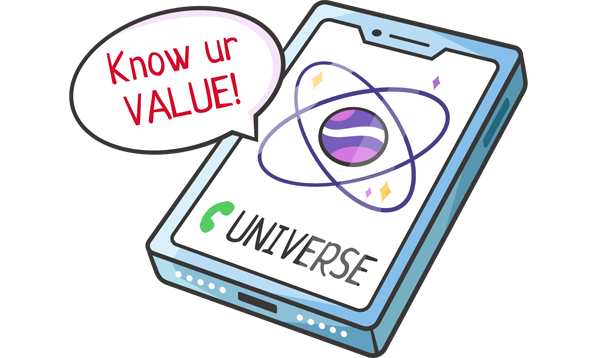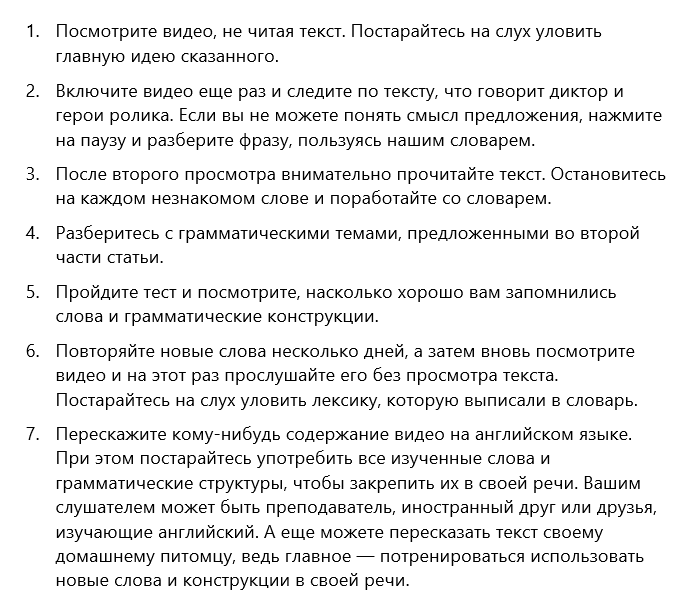Автор видеоролика — Анна Акана — в юмористической манере рассказывает, как полюбить и не потерять себя в поисках одобрения и внимания других людей.

Семья, работа, неподъемный груз обязательств — в бешенном ритме жизни так просто забыть о себе и своей ценности. Необходимо прислушаться к себе и понять, что собственные потребности и гармония — важные элементы счастливой жизни, а потому, возможно, не всегда стоит быть безотказным другом, бояться обидеть своего партнера и думать только о чувствах и желаниях других людей.

Видео: Know Your Value. — Знай свою ценность.
| Текст | Словосочетания |
|---|---|
| Anna: Usually the universe will send us a message. This message is the next step in our personal and spiritual development; the lesson that we need to learn to grow, and if you ignore the universe, it’ll just get louder. Oh, a phone call. What is this a personal attack... and louder. |
usually — как правило, обычно the universe — вселенная spiritual development — духовное развитие a personal attack — нападение на личность |
| Universe: You can’t ignore me Anna, this is the universe. I have a very important message for you. Okay, I need you to know your value. Anna: Until finally, it seems kind of ridiculous. |
value — значение, ценность kind of — довольно, некоторым образом ridiculous — нелепый, смешной |
| Psychologist: In theory, would you want this... twenty dollars? Patient: In theory? Yeah, but I guess also in reality, yeah. Psychologist: Even if I did this? Patient: Uhh… yeah? Psychologist: What about this? Patient: Yeah, I mean it’s still $20. Psychologist: What if I farted on it? Patient: No, actually I would definitely pass in that case. Psychologist: Okay, well, I mean never mind then, but like, isn’t it interesting that no matter how much I beat up this twenty-dollar bill, it still has its inherent value? Patient: Okay, I get it! Psychologist: Who are you talking to? |
to guess — предполагать, угадывать still — все еще never mind — неважно to beat up — трепать, избивать inherent — свойственный, неотъемлемый |
| Anna: So for the last few years, my one goal has been to recognize my self-worth and to practice self-love, and you know, in the midst of things it’s really hard to tell whether or not change is actually happening but, a few months ago, someone I’ve been seeing romantically told me. | one goal — единственная цель to recognize — понимать, осознавать self-worth — самооценка, самоуважение self-love — любовь к себе in the midst of — в разгар чего-либо, среди чего-либо whether or not — так или иначе |
| Boy: So... I’ve like, decided, I don’t actually want a relationship anymore, but don’t worry I’m still down to like chill and have all the perks of a relationship without any of the emotional accountability. Anna: Now freeze on my big, dumb, stupid face! Old Anna would have a hundred percent said: “Oh, yeah, of course.” Boy: That’s tight, right? That’s like a solid deal. Anna: Yeah, I mean, that’s exactly what I want that lines up. While inside I would have thought: “Why don’t they like me enough to commit, you know? Maybe if I stick around they’ll see how awesome I am and change their mind like, I can prove to them that I’m a really great person and I would make a great partner.” But not today satan, today, I say: “Okay, well. I totally understand that, but I’m actually looking for a commitment and I can’t just like hang out with people without developing feelings so, I’ll have to bow out, but it was really nice getting to know you.” |
like — вроде как to be still down to — все еще хотеть a perk — привилегия, преимущество emotional accountability — эмоциональное обязательство dumb — глупый to line up — выстраиваться to commit — связать себя обязательствами to stick around — задерживаться, оставаться to change one’s mind — изменить мнение, переубедить to prove to — доказать кому-либо to make a great partner — стать отличным партнером a commitment — обязательство to hang out — тусоваться, весело проводить время to bow out — откланяться, удалиться, уйти |
| I was so proud of myself you guys and I know it doesn’t seem like a big deal but this, this is me knowing that I am worthy of being committed to. In the past, my usual MO has been that “I’ll stick around”, confident that I’m gonna grow on them like a barnacle and/or fungus, and become so indispensable to their life that they can’t help but make me their girlfriend. But not anymore! I have listened to the universe! I have learnt. |
a big deal — важное событие worthy — достойный MO (modus operandi) — образ действия a barnacle — банный лист (о человеке) a fungus — грибок indispensable — незаменимый can’t help but — не могу не |
| So for those of you struggling with knowing your value, how do we get here? Well, in therapy, I’m learning about positive resilience. So my therapist says that our brains pick out our flaws, right? We’re designed to look for the negative and focus on our weaknesses because it’s how we survive. | to struggle with knowing — пытаться понять resilience — устойчивость, способность быстро восстанавливаться to pick out — выбирать a flaw — недостаток a weakness — слабая сторона |
| So to cultivate a sense of self-worth, we need to shift that focus onto our strengths, believe in ourselves, and be clear about our values. That means knowing your boundaries, having the courage to speak up for yourself, and finding ways to validate yourself from within, instead of externally. That one I haven’t quite figured out yet because I love attention. Now I know this is all very abstract. Right? Like, how do we get to this practically? |
to cultivate — развивать a strength — сильная сторона a boundary — граница courage — храбрость to speak up — высказывать свою точку зрения to validate — подтверждать externally — внешне to figure out — выяснить, понять |
| There are many ways, and you can find the ones that speak to you, whether that’s taking the Clifton strengths assessment and taking a moment to reflect every week about how you exhibited your strengths, therefore doing one rep and mentally solidifying positive resilience, or you can write affirmations over and over again to take advantage of the link between what we write down, and how we affect our subconscious beliefs. | the Clifton strengths assessment — система оценки сильных сторон to exhibit — проявлять (качества) therefore — следовательно a rep — повторение an affirmation — позитивная установка subconscious — подсознательный |
| You can explore these issues in therapy: future-self journal to shift your patterns, and/or listen to guided meditations. One thing you must absolutely do is give yourself time, measure change in six-month increments, sometimes year increments because when you’re in the muck of day-to-day journaling or repeating affirmations in the mirror: “I’m beautiful! I’m beautiful! I’m beautiful!” It can be hard to really see whether or not it’s working, but after you’ve been at it for a substantial amount of time, when the opportunity arises, you’ll see whether or not you’re making progress. So do not be discouraged, because before you know it, you will see the difference. |
a pattern — привычка an increment — прирост substantial — существенный |
| Boy: I want a relationship with you and also you and you. Girls: No, absolutely not. Aye! Look at us! Yaas. Oh my God! |
Минута грамматики
Разберем некоторые грамматических моменты, которые встречались в речи героини видео.
Условные предложения
Сегодня остановимся на теме условных предложений (Conditionals) в английском языке.
В видео героиня использует первый тип условных предложений, размышляя о событиях, которые могут произойти. Conditionals первого типа строятся по следующей формуле:
| Условная часть предложения | Основная часть предложения |
|---|---|
| If + Present Simple, | Future Simple |
If you ignore the universe, it’ll just get louder and louder. — Если вы проигнорируете вселенную, она будет становиться все громче и громче.
Maybe if I stick around, they’ll see how awesome I am. — Может, если я останусь, они увидят, какая я замечательная.
Также в видео есть пример второго типа условных предложений, который описывает ситуации настоящего и будущего, вероятность совершения которых очень мала. Такие предложения строятся по следующей формуле:
| Условная часть предложения | Основная часть предложения |
|---|---|
| If + Past Simple, | would + смысловой глагол без частицы to |
Would you want this twenty dollars, even if I did this? — Хотели бы вы получить эти двадцать долларов, даже если бы я сделал это?
If I were very rich, I would live in a palace. — Если бы я был богат, я бы жил во дворце.
Существуют и другие типы условных предложений. Давайте рассмотрим и их.
Нулевой тип условных предложений — самый простой. Здесь мы говорим об общеизвестных истинах, законах, правилах.
| Условная часть предложения | Основная часть предложения |
|---|---|
| If + Present Simple, | Present Simple |
If the temperature is 100 degrees, the water boils. — Вода закипает, если температура достигает 100 градусов.
Третий тип условных предложений используется при высказывании сожалений и обсуждении нереальных событий прошлого.
| Условная часть предложения | Основная часть предложения |
|---|---|
| If + Past Perfect, | would have + Past Participle |
If you had heard that conversation, you would not have invited her to dinner. — Если бы ты услышал тот разговор, ты бы не пригласил ее на ужин.
Проверьте себя
В завершение предлагаем закрепить пройденный материал с помощью теста.
